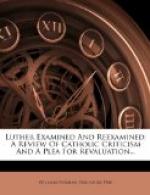When Catholics explain Luther’s failure as a monk by such assertions, they involve themselves in self-contradiction. By their own principles monkery is not a natural life; yet, when a monk fails in his monkery, they fault him for not being natural. First, they tell the applicant that he must not be what he is, and afterwards they blame him for wanting to be what they told him to be, and what he finds he cannot be. If this is not adding insult to injury, what is? Francis of Assisi became a great saint by that very inhuman treatment of himself for which Luther is censured. But then Francis of Assisi did not quit his order and did not attack the Pope.
The other reason why Luther failed is, because he could not make a Pharisee of himself, which is only another name for hypocrite. The Law of God had such a terrible meaning to him because he applied it as the Lawgiver wants it applied, to his whole inner life, to the heart, the soul, the mind, and all his powers of intellect and will. It is comparatively easy to make the members of the body go through certain external performances, but to make the mind obey is a different proposition. The discovery which disheartened Luther was, that while he was outwardly leading the life of a blameless monk, his inward life was not improved. Sin was ever present with him, as it is with every human being. He felt the terrible smitings of the accusing conscience because he was keenly alive to the real demands of God’s Law. The holy Law of God wrought its will upon




